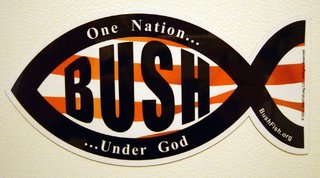
Scott at Powerline writes
So, let's recap. Revealing that the President authorized the National Surveilligance Agency to engage in warrantless spying on American citizens without a warrant, despite having promised that would never happen, and despite there being a law written in 1978 to specifically prohibit that from happening, constitutes treason and espionage.
Following in the footsteps of the AP last year, New York Times reporters James Risen and Eric Lichtblau won the Pulitzer Prize today for their treasonous contribution to the undermining of the highly classified National Security Agency surveillance program of al Qaeda-related terrorists. As I wrote in a column for the Standard, the Risen/Lichtblau reportage clearly violated relevant provisions of the Espionage Act -- a particularly serious crime insofar as it lends assistance to the enemy in a time of war.
Scott also identifies the program as a "surveillance program of al Qaeda-related terrorists." See, if you're opposed to warrantless surveillance in violation of the law, you're now by definition against spying on terrorists, because, well, the President called it a "terrorist surveillance program", so, gosh, shucks, gee wiz, it must be only terrorists that get spied on. Never mind the distinction between the idea of being opposed to spying on terrorists and being opposed to this specific spying program, a nuance that is apparently beyond Scott.
4 comments:
Oh yeah, that's how it works now! So if you expose their bid rigging, or their war profiteering, or their insider trading, you go to prison! Because you're Al Qaeda!
In “Perilous Times: Free Speech in Wartime,” Geoffrey Stone writes that the House rejected the “press censorship” provision of the 1917 Espionage Act, despite President Wilson’s direct appeal. While some congressmen favored it, saying that the country should trust its commander-in-chief to decide whether information would harm the country or aid the enemy, others described it as un-American and warned that it would create an unconstitutional law and give the president unlawful power. Opponents also did not want to limit freedom of the press, which they considered essential for a healthy democracy. The House defeated the provision on a bipartisan vote.
In 1971, Stone goes on to relate, the Nixon administration accused the New York Times and the Washington Post of violating the Espionage Act by publishing the Pentagon Papers, but Congress had already refused to include press censorship in the act, which made for a weak argument. Federal district courts ruled against the government, and the Supreme Court also decided that the administration had not made its case. I’m not a lawyer or a scholar, but doesn’t this mean that the Espionage Act doesn’t apply to these reporters, since Congress specifically rejected the attempt to curtail freedom of the press when it enacted the law?
Sadly, though, this may not matter to people who can dismiss the Geneva Conventions and rewrite the Constitution....
That's why I put up the Bush Fish r. Flitworth, the way Powerline and other Bush supporters call this action treason and a violation of the Espionage Act makes the definition of national interst become synonymous with the personal and private interests of the President.
Despite what might be their sincere belief otherwise, that is a very un-American sentiment.
I'm not sure the answer to your question, but seeing as the DoJ is already looking to prosecute the Times, I think its safe to assume that the precedents you cite do not matter to them.
Yep, I was afraid of that, Ghost. And it's so infuriating because the logic Stone lays out seems so obvious. I'm afraid war with Iran isn't the only juggernaut that's on the move in our country.
Yet many of the situations Stone covers in his book (WW1, WW2, Cold War) were much worse than what's happened so far. Somehow, it helped a little to know that altho our country did behave execrably, it eventually regained its senses.
Post a Comment